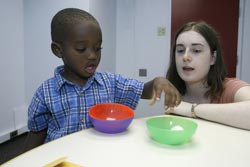Communication skills get kids off to a good start
Speech problems identified as early as 2
 Photo by Ryan S. Brandenberg/Temple University
Communications Sciences graduate student, Jennifer Shields, works with Theodore Justice at the Speech-Language-Hearing Center
|
Speech problems affect about 10 percent of preschool and school-age children. Approximately 50 percent to 70 of percent of children in this group will face general academic difficulty, and some might experience the stress of being teased and bullied in school.
If problems are caught early, however, interventions such as speech therapy could help minimize potential academic and emotional complications before a child starts kindergarten. “Children with speech problems are at risk for difficulties with reading, writing and spelling. Often times, speech problems require therapy to correct,” said Brian Goldstein, Ph.D., CCC-SLP, a professor of communication sciences and disorders at Temple University. |
|||
|
“Not being able to communicate their needs can cause children considerable frustration and can result in frequent tantrums and other behavioral problems,” said Beth Levine M.S., CCC-SLP, the director of clinical education and clinical services in the Department of Communication Sciences and Disorders. If parents suspect a problem, it is generally recommended that the child be evaluated by a speech-language pathologist, a professional specializing in helping children with speech problems. These evaluations can determine if the child requires therapy, and if so, the kind of therapy that would be most helpful. In addition, these evaluations provide important information to help parents understand the nature of a problem and guide them in how they can best address it. “After an evaluation, a speech-language pathologist can provide specific recommendations on how to help your child at home. I would not suggest correcting the child without first having an evaluation,” Goldstein said. At Temple, the Speech-Language-Hearing Center provides a wide range of services such as evaluations to people of all ages with communication disorders. This ranges from adults who started to experience speech problems after a brain injury such a stroke to young children with delays in speech development. The center serves clients in the Philadelphia region and New Jersey. The center is the clinical component of a nationally accredited graduate program in speech-language pathology at the university. Graduate clinicians provide services under the direct supervision of Temple faculty who hold the Certificate of Clinical Competence from the American Speech-Language-Hearing Association and Pennsylvania licensure in Speech-Language Pathology and/or Audiology. Most parents have a good understanding of their child’s development and often know if their child’s speech is not developing as it should. A parent should also ask others who are less familiar with the child to try and figure out how often you understand the child. Often times, parents can help determine if their child has a speech problem, Goldstein said. “Parents often feel a sense of guilt if their child’s development has not proceeded as expected. If your child has a speech problem, you should know that you did not cause the problem. For the most part, we don’t fully understand why children have speech problems. They often “just happen, ” Goldstein added. Parents should be able to understand their child: • At age 2: about 50 percent of the time “Parents can also compare their child to other children of the same age. However, it is also important to know that prior to age 6, children show a wide range of speech skills. Kids develop differently,” Levine said. Philadelphia resident Fitzia Justice brings her 2-year-old son to the clinic for weekly sessions. Justice decided to pursue an evaluation after she noticed her son wasn’t progressing enough after starting daycare in October 2006. “He wasn’t talking. He was just pointing at things,” Justice said. She’s seen improvements after starting sessions at Temple’s clinic in January, where a graduate student helps him speak with various structured activities. “He’s doing very well, stringing four to five words in a sentence,” Justice said. “My goal is that he’ll do well in school. We want the very best.” For more information on the clinic services, go to www.temple.edu/chp/departments/commsci/clinic.htm or call 215-204-7543.
|
||||